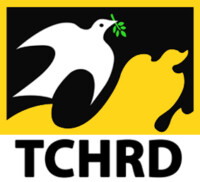Two Tibetan Buddhist monks have been detained by the local Chinese security forces for launching solo protests in separate incidents last week in the main streets of Ngaba County town in Ngaba (Ch: Aba) Tibetan and Qiang Autonomous Prefecture, Sichuan Province, in the Tibetan province of Amdo.
TCHRD has received reliable information that the monks, Adrak, age 20, and Lobsang, age 22, were detained as soon as they began to protest and raise slogans for “Tibetan freedom” and “long life of the Dalai Lama” in the busy streets of Ngaba County town.

Adrak and Lobsang belong to Kirti Monastery where they were students of ‘Buddhist Logic’ before their detention. Kirti monks have been staging relentless peaceful solo protests in Ngaba area in the past year, with the frequency of such protests increasing following the Chinese government’s criminal crackdown on self-immolation protests. Lay Tibetan women from Meuruma town, a cluster of nomadic villages in Ngaba County, have also staged solo protests in the same fashion as those by Kirti monks. (Click here, here and here for more on solo Tibetan protesters.)
Adrak staged his solo protest on the morning of 10 September but local security forces immediately nabbed him as soon as he began to raise slogans freedom and long life of the Dalai Lama. Security forces beat him up and detained him.
Many local Tibetans who joined Adrak in protest were also beaten up and detained.
Detailed information about those detained along with Adrak, including their names and places of residence, remains unknown at the moment.
Adrak is a cousin of Lobsang Tsultrim, another Kirti monk who was sentenced to 11 years in prison for having alleged links with a self-immolation protest. Lobsang Tsultrim was 19 years old at the time of his sentencing (click here for more information on Lobsang Tsultrim).
Lobsang, the other solo protester from Kirti Monastery, was also detained the same evening on 10 September. He staged his protest in the streets of Ngaba County town at around 6 pm local time. He raised the same slogans as Adrak calling on the Chinese government to grant freedom to Tibet and for the Dalai Lama to live a long life.

Lobsang met the same fate as fellow monk Adrak. Local security forces immediately detained him as he began to raise slogans to stage his protest. His whereabouts remain unknown at the moment.
Lobsang, 22, hails from Chukle Gabma, Ngaba County. He was born to parents Gatse (father) and Nekyi (mother). The couple has five children, of which Lobsang is the fourth oldest. He joined the Kirti monastery at a young age.
Adrak hails from Soruma village in Choejema town in Ngaba County. He was born to parents Zampa (father) and Rikho (mother). The couple has nine children, out of which Adrak is the youngest. He too joined Kirti Monastery at a young age.
Sources with contacts in Tibet said that Ngaba County town witnessed a couple of more solo protests in the afternoon of 10 September but their identities of the protesters remain unclear at the moment. Due to heavy presence of armed police and sophisticated surveillance system in Ngaba area, it has become easier for authorities to seize any Tibetan protesters with or without the knowledge of onlookers . A large number of arbitrary detention and arrests of Tibetans goes unreported or remains unknown due to fear of reprisals as well as the criminalization of sharing information about human rights violations with outsiders.
Within a week, Chinese security forces have arbitrarily detained four known Tibetans for launching peaceful solo protests, calling for Tibetan freedom and the long life of the Dalai Lama. In addition to Adrak and Lobsang, two other Kirti monks Lobsang Kelsang, age 19, and Jampel Gyatso, 21, were detained respectively on 7 and 9 September. Their current condition and whereabouts remain unknown.
Restrictions have been further tightened in Ngaba following the solo protests on 10 September. All Internet connections have been shut down and police presence have been increased. The number of police vehicles guarding and patrolling the intersections of the County market town has increased.
TCHRD condemns the arbitrary detention of peaceful protesters and the continued attack on their right to freedom of expression and peaceful assembly. The right to protest peacefully encompasses a set of rights that includes freedom of expression and opinion, freedom of association, freedom of peaceful assembly and trade union rights, including the right to strike. The right to protest is protected and recognized under various international and regional human rights instruments such as the International Covenant on Economic, Social and Cultural Rights (Article 8); The Inter-American Charter of Social Guarantees of 1948 (Article 27); The European Social Charter of 1961 (Article 6 (4)); The Additional Protocol to the American Convention on Human Rights in the Area of Economic, Social and Cultural Rights of 1988 (Article 8 (1)(b)); and The Declaration on Human Rights Defenders (Article 5(a)). Chinese Constitution also recognizes the right to “freedom of speech, of the press, of assembly, of association, of procession and of demonstration” (Article 35). By criminalizing human rights activists and critics of official policies, the Chinese government is in effect demonstrating the hollowness of its own constitution and law, even as the current Chinese leadership keeps on harping about the importance of rule of law.
